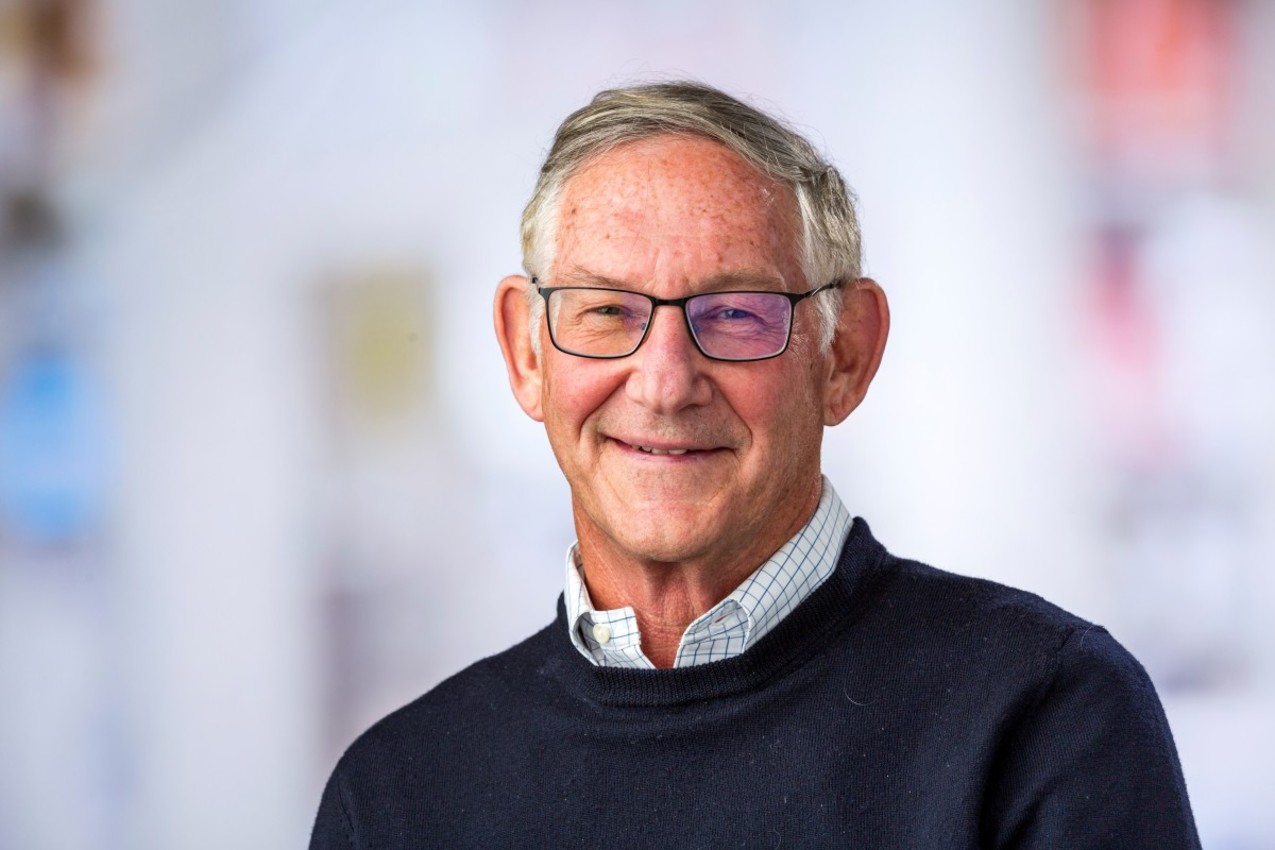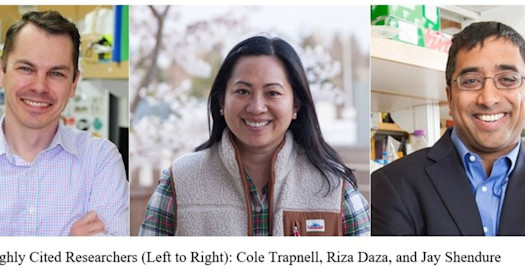 Dr. Larry Corey
Dr. Larry Corey
"I can think of no one more deserving. His impact on the field of infectious diseases, from herpes viruses to HIV to COVID-19, has been most extraordinary. He is truly a giant in the field...." Dr. Anthony Fauci on Dr. Larry Corey
At a Washington, D.C. conference on infectious disease science, Dr. Anthony Fauci today presented a lifetime achievement award to his friend and longtime collaborator Dr. Larry Corey, an internationally renowned virologist and former president and director of Fred Hutchinson Cancer Center.
The prestigious award, given by the Infectious Diseases Society of America (IDSA), was created in 1964 in honor of the late Dr. Alexander Fleming, the Scottish doctor and microbiologist who received the Nobel Prize in 1945 for his discovery of penicillin.
“I am so pleased that Larry will receive this award, and I am doubly pleased that I will have the opportunity to present this award to my dear friend and colleague with whom I have collaborated and shared close friendship over the past 40 years,” said Fauci, prior to the ceremony.
“I can think of no one more deserving. His impact on the field of infectious diseases, from herpes viruses to HIV to COVID-19, has been most extraordinary. He is truly a giant in the field, deserving of all the recognition that he has received, and will receive.”
Fauci plans to step down at year-end as director of the National Institute for Allergy and Infectious Diseases and chief medical adviser to President Joe Biden. In 1999, Fauci himself was recipient of the Fleming award.
The conference, called IDWeek, is a joint conference of IDSA and four other infectious disease research organizations that brings together thousands of doctors and scientists who work on ways to prevent and treat diseases caused by microorganisms including bacteria and viruses.
“When you’ve spent your life in infectious diseases, and to be recognized like this, by the society that represents your field of expertise is a real honor. It’s probably my life’s biggest professional honor,” said Corey, in an interview prior to the conference.
Corey has attended IDSA meetings for decades. “The cadence of academic life was built around those meetings in October,” he said.
“You prepared the abstracts, you went to the meetings to present your work and debate your findings, you built relationships, you created the next set of collaborations. You developed camaraderie.”
Corey said it was particularly meaningful to receive an award that has been given in the past to colleagues at the University of Washington, where he launched his academic career under the tutelage of experts who built Seattle’s reputation as a premier center of infectious disease research. Several of those mentors and colleagues have won the Fleming award in prior years. They include Drs. Paul Beeson, who received it in 1972; William Kirby, 1977; Seymour Klebanoff, 1993; Merle Sande, 2006; and King Holmes, 2013.
“It has a lot of meaning to be able to say that you’ve met the standards of the mentors who taught you, and that you were able to carry on that kind of quality,” Corey said.
He also stressed that the award is a tribute to the teams of colleagues he has worked with throughout his career.
“No one gets these kinds of awards by themselves,” he said. “I owe gratitude to the medical fellows, research scientists and collaborators who were involved in our work.”
Coordinating massive COVID-19 vaccine trials
Corey is being recognized this year as the world prepares to complete its third year since the emergence of SARS-CoV-2, the virus that causes COVID-19. Early in 2020, Fauci, Corey and other leading infectious disease experts developed a model for rapid development and clinical testing of vaccines. Corey was tapped to lead operations of the COVID-19 Prevention Network, or CoVPN, established to coordinate massive trials of several vaccine candidates.
The effort was modeled after the HIV Vaccine Trials Network, or HVTN, which is the world’s largest publicly funded international collaboration testing and evaluating potential vaccines against HIV/AIDS. At Fauci’s request, Corey founded the NIAID-funded organization in 1999 and has been its co-principal investigator ever since.
Corey began his virology career in the late 1970s as a young researcher studying genital herpes at the University of Washington. He began working on a project developed in collaboration with Burroughs Wellcome biochemist Gertrude Elion on a then-radical idea to develop an antiviral drug to treat herpes. The drug she pioneered, acyclovir, remains the primary treatment for herpes, and it paved the way for development of antiviral drugs that would become life-saving therapies to control HIV/AIDS.
“The very first, really effective antiviral, acyclovir, was dropped in my lap when I was 28 years old,” Corey said. “Gertrude Elion won the Nobel Prize for that drug and I was lucky enough to be able to be a part of its development. That set off a revolution in the development of antiviral medications.”
Until the development of acyclovir, conventional wisdom was that a molecule that interfered with viral replication so intimately associated with a cell’s inner workings would also kill the cell — the drug would be too toxic.
Controlling HIV with antiviral drugs
When the HIV/AIDS pandemic burst on the scene, Corey began organizing clinical trials of antiviral drugs and drug combinations directed at stopping the growth of HIV, the virus that causes AIDS. He headed the AIDS Clinical Trials Group, a network of testing sites that first established that the antiviral drug AZT could prevent mother-to-child transmission of HIV; and designed and oversaw the trials of antiviral drug combinations that were eventually found to control, but not eliminate the virus. It meant HIV infection, treated continuously, was no longer a death sentence and people taking antiviral drug combinations could now live with the virus for decades.
“When you go from having nothing to something, there is nothing more impactful than that,” Corey said. “I have been lucky, incredibly lucky, to be able to have been a factor in three things that really influenced people in the world, in a major way.”
Corey noted that the work he has been involved with is still not done. Genital herpes became treatable in the 1980s, but the disease is not cured and there is no vaccine for it. Interest and money for research in that field has been limited. HIV is controllable with antivirals, but a vaccine remains elusive. And COVID-19, despite the development of effective vaccines, is still with us.
But Corey said that his experience with these three diseases has been a lesson in how to solve medical problems with what he calls “concerted science,” a mixture of funding and collaboration between government, academic and commercial research.
“Research is scalable when collaborative groups are put together and funded to reach their scientific potential. HIV and COVID-19 are great examples of this,” Corey said. “How we organize ourselves seems to influence the outcomes we can achieve.”


